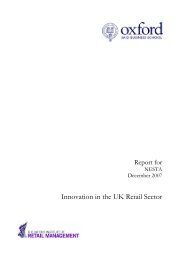Everyday innovation report - Nesta
Everyday innovation report - Nesta
Everyday innovation report - Nesta
You also want an ePaper? Increase the reach of your titles
YUMPU automatically turns print PDFs into web optimized ePapers that Google loves.
Executive summary<br />
The imperative to promote innovative working<br />
remains strong in all sectors despite the current<br />
economic climate. However, although these<br />
aspirations exist, many working practices that<br />
promote <strong>innovation</strong> are not being readily<br />
adopted by organisations. When comparing<br />
sectors, this is particularly prevalent in public<br />
sector organisations. Here, some working<br />
practices may actually inhibit innovative working.<br />
Similarly, whilst the employee characteristics and<br />
behaviours that enhance innovative working<br />
(such as motivation for change, openness<br />
to ideas and original problem solving) can<br />
be clearly identified and measured, there is<br />
limited evidence that organisations are actively<br />
integrating the research evidence into corporate<br />
HR policy and practice.<br />
Leadership capability, organisational culture,<br />
and organisational values are among the most<br />
important organisational factors and initiatives<br />
that enhance innovative working. Although<br />
there is a growing awareness of this, there is a<br />
persistent gap between what we know about<br />
these factors and how they are put into practice;<br />
how to enhance innovative working continues<br />
to be the most significant challenge for<br />
organisations. This <strong>report</strong> uses several practical<br />
examples to show how to promote everyday<br />
innovative working at the employee, group,<br />
leader and organisational levels.<br />
The research <strong>report</strong>ed here focuses upon<br />
the critical role employee characteristics and<br />
behaviours play in innovative working and<br />
reveals the key organisational factors that<br />
enable or inhibit <strong>innovation</strong>. Most importantly,<br />
we present the practical implications regarding<br />
how to best facilitate innovative working and<br />
promote <strong>innovation</strong> in organisations. The<br />
evidence base for this research was drawn from a<br />
comprehensive review of the relevant literature,<br />
key stakeholder interviews, case studies and<br />
a UK-wide survey facilitated by the Chartered<br />
Management Institute (CMI) based on 850<br />
responses from CMI member organisations.<br />
Innovative working remains an<br />
imperative for most organisations<br />
In the context of the current economic crisis<br />
and pressing social challenges, organisational<br />
capacity to innovate and improve productivity is<br />
becoming an imperative.<br />
Results from the survey indicate that <strong>innovation</strong><br />
is considered one of the few proactive strategies<br />
an organisation can take to regenerate growth<br />
and fight a recession. Innovative working<br />
is expected to be reinforced in the current<br />
economic climate to meet the demands of<br />
an increasingly competitive marketplace. Of<br />
the 850 responses, 78 per cent considered<br />
<strong>innovation</strong> ‘very’ or ‘extremely important’ to<br />
their organisation’s agenda in terms of products,<br />
processes or business models. There were<br />
surprisingly high levels of optimism regarding the<br />
future; 77 per cent of respondents <strong>report</strong> being<br />
‘optimistic’ about the future of their organisation.<br />
Despite some interviewees viewing the current<br />
economic climate as a strong incentive to<br />
innovate in all aspects of their business, others<br />
<strong>report</strong> the need to focus on certain types<br />
of <strong>innovation</strong> like incremental <strong>innovation</strong> in<br />
business processes, which typically require fewer<br />
resources than more radical forms of <strong>innovation</strong>.<br />
This concurs with a third of survey respondents<br />
who expect the available resources for <strong>innovation</strong><br />
to be significantly reduced. Importantly, the<br />
public sector was found to be less focused on<br />
3







